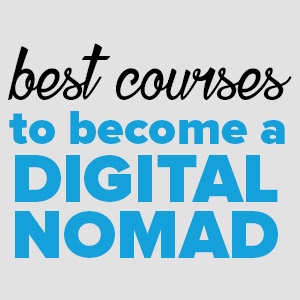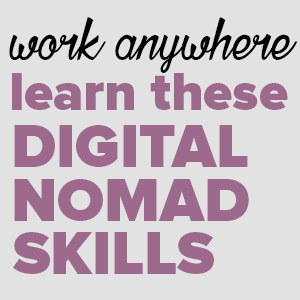So you want to start an online business but you’re not sure which business to start? Not sure if you should be running an online business in the first place?
Having doubts in yourself while exploring online business ideas for beginners is quite normal, just as it is when you’re trying out anything for the first time.
Being a business owner can be challenging, but it’s also one of the best ways to set yourself up for financial and career freedom. It also comes with a host of other benefits.
Owning your own business gives you control over your own time. It means being your own boss and you can spend your time as you see fit. No need to slave as you build someone else’s dream. This sense of freedom is unmatched.

Free MEGA Guide
86 Ways to Make Money Online
Download our free guide on legitimate ways to make money online in 2021
By signing up, you are agreeing to receive periodic emails from Fulltime Nomad. No spam. Only the good stuff.
Being a business owner gives you higher income potential. You are not limited by a salary but by your hard work and shrewdness in business.
When you move from being an employee to a business owner you open yourself up to the possibilities of living the life of your dreams. You get to set your own schedule, control your own money, do your own thing.
An online business is a perfect choice for all the freedom-seekers out there. Whether you want to be free of a boss, have more free time to spend with your family, or want location freedom (so you can live that work from anywhere digital nomad life).
Does this sound like you? If yes, then you definitely should consider a couple of online business ideas available.
And you may be surprised to know that the success of the business you choose to start is not governed so much by the “how” of starting a business online, as it is by the “why.”
With that said, let’s take a quick look at 5 top best online business ideas for beginners and why they are great options for you.
*This post may contain affiliate links. If you click on them and purchase something we get a small percentage of the sale. More info here*
5 online business ideas and how to decide which one is right for you
1. A freelancing business
Owning a freelance business means you are self-employed and offer services to multiple clients at one time. Freelance work is usually short-term. While as a freelancer you may not be officially employed by another company, you can be subcontracted by other businesses but still enjoy the benefits of a freelancer such as flexible schedules, remote working etc.
Pros & cons of a freelance business
A freelance business allows you to work for as many clients as you can manage and you get to choose who to work for and what to work on. So for instance, if you’re a graphic designer you can choose to offer logo design services only to as many people as you want.
You have unlimited earning potential as you can charge, reasonably, as much as you want and you can take on as much work as you want.
As a freelancer, even if contracted by a company, you have the freedom to work from anywhere you wish. You can work from home, your favourite coffee shop or even a totally different country from where you live!
On the other hand, it’s not all rosy. A freelance business comes with some negatives.
Payments can be quite sporadic especially when you’re starting out. Too often newbie freelancers find themselves doing the work but never seeing the paycheck, or receiving their paychecks late.
Unlike with a traditional job where your workload and salary is guaranteed, as a freelancer, you have to continuously hustle for clients to keep the money flowing.
Forget employee benefits such as health benefits, 401k, paid leave, etc. You will have to go it alone when it comes to these things.
Is a freelance business right for you?
So what does it take to run a successful freelance business?
- The right skills: Freelancing is highly competitive. You must be skilled in the field you want to freelance in. If you want to be a freelance writer then you must have top-notch writing skills to keep attracting clients.
- Independent worker: Do you naturally take initiative in situations? Then freelancing is for you. Nobody will be following up with you to see if you’ve done your job or not. Nobody will be doing your invoices for you. Nobody will bring you the work. You have to do all this by yourself.
- Persistence: You can have all the right skills, but if you aren’t willing to be persistent when things get tough you will continue to struggle.
- Time management: Yep, you may have control over your time and the freedom to do whatever you want whenever you want, but remember you’re running a business. This freedom demands impeccable time management and discipline. You have to create some type of schedule that works for you so you meet deadlines and still have time to play.
2. A blog
A blog (short for “weblog”) is an online journal or informational website where the owner (blogger) shares their views on an individual subject.
Pros & cons of a blog
A blog is a low-cost investment that requires very little up-front cash. In most cases, it will just be money to register a domain name and web hosting. If you already have a website you simply create a blog page on your site—no extra resources required.
Blogging comes with great flexibility as you can run it from literally anywhere. All you need is a laptop and an internet connection.
A blog gives you a chance to establish yourself as an expert. Even if you don’t intend to make money from a blog, especially if you have a freelance business, authoritative blogging helps to establish yourself as an expert in a niche. This has a huge reward for your business as you become more trustworthy.
You have many options to make money with your blog such as affiliate marketing, sponsored ads, selling digital products such as eBooks and tutorials, membership sites, AdSense, coaching, selling advertising space, sponsored posts, etc.
Cons
Blogging requires commitment and a lot of time for you to make any money. You must update your content regularly.
Blogging is not a get-rich-quick scheme, so if you want to give blogging a shot with hopes of making thousands of dollars within the first month, you better move on to other business ideas for beginners.
Technical issues can be frustrating for most people. Unfortunately, technical issues such as expired malware, SSL certificates, plugin conflicts, coding problems, etc. are unavoidable and they can be quite frustrating for the nontechies.
Is blogging right for you?
Does writing come naturally for you? Do you have a lot of knowledge or a passion for a certain topic? Then blogging is an online business you should definitely consider.
Here are some other qualities that make a good blogger:
- Consistency: You need to be consistent in your blogging for it to become a worthy endeavour. A post here and there once in a while just won’t cut it.
- Uniqueness: Most online users are looking for something odd and unusual. So make your blog as unique as possible so that you can stand out from the millions of websites existing today.
- Detail-oriented: To produce thought-provoking blog pieces that add value to your readers you must have a keen interest in the details. You must be really good at doing research.
- Network/Industry reach: The more traffic and industry reach your blog has, the more loyal fans you will have and consequently the more money your blog will make.
- Enjoy sharing and helping: Great bloggers genuinely enjoy helping others. Seeking satisfaction out of helping others in your industry will see you crafting blog posts that your readers will love and find useful.
See also: Blogging Blueprint: Zero to Passive Income Step-by-Step
3. Affiliate Marketing
Affiliate marketing is one of the most popular ways to make money online and if set up well, it can earn you a passive income. Yes, make money while you sleep.
Affiliate marketing involves promoting other people’s or company’s products through an affiliate network and then earn a commission if people actually end up buying because of your marketing.
So if you use a lot of products and services that others might find helpful too and you are an innovative thinker, then affiliate marketing is one of the best online business ideas for you.
Do you have to be a blogger to make money?
No.
Blogging is one (and the most popular) way to make money from affiliate marketing but there are other ways too. Such as:
- Influencer marketing: An influencer is someone who holds the power to impact the purchasing decisions of a large segment of the population. Businesses often use influencers to promote their products and in return, the influencers make a commission from the sales.
- Email lists: This involves creating email lists that you can use to promote the seller’s products. You can also use email newsletters that include hyperlinks to products, earning a commission after your readers make a purchase.
See also: How To Make Money Sending Emails – Email Marketing 101
- Incentive/Loyalty/Referrals: You get paid a commission for recommending products to other people. This is a good idea for products you regularly use and have faith in.
- Reviews: Another way to make an affiliate income is through testing and reviewing products. You get products from companies, use them, give an honest review and then drop a link to where it can be purchased.
Pros
- Passive Income: The ability to earn money while you sleep is what makes affiliate marketing one of the top online businesses. Once you have your affiliate marketing business set up and you have an adequate audience you can continue to make money even without doing anything. For instance, if you do a product review and add a link to purchase the product, people can use that link many months after you put the review up.
- No expertise needed: You don’t need to be a marketing expert to start an affiliate marketing business. This is one of those businesses where you can learn the ropes on the job.
- Low investment costs: The operating expenses of the affiliate business are almost non-existent.
- A secondary source of income: You don’t have to quit your day job to run a successful affiliate marketing business. You can do it as a side project without jeopardizing your job.
- No customer service needed: Even though you will be promoting products it’s not your responsibility to manage customer service-related issues. You only need to make people aware of the product, convince them to buy and sit back and enjoy your commissions.
Cons
- You have no control over affiliate marketing programs: You have no say in how much percentage you get paid in commissions. You are entirely dependent on your merchant’s rules and must respect their conditions.
- No guarantee of revenue: Pay-per-performance can be a great opportunity to make a lot of money but it can also be a significant risk. There is no guarantee that you are going to earn the expected revenue right away and it’s difficult to predict how much money you will make.
Is affiliate marketing business right for you?
Are you creative? Affiliate marketing requires creativity in getting people to buy the products you promote.
Can you handle the technical stuff? Being an affiliate marketer requires some basic technical knowledge such as how to build landing pages, set up your commission tracker, set up ads, email marketing, etc.
Are you resilient? Every business has its ups and downs, and affiliate marketing isn’t any different so you need to be resilient and keep going.
See also: How to Get Paid to Promote Products: Your Guide to Affiliate Marketing for Bloggers
4. Sell physical products online
If you’re interested in simple, easy to start online business ideas for 2020 then selling physical products online is a good place to start. There are two ways to sell physical products online:
a) Dropshipping
Dropshipping is a business model that enables you to operate without having to maintain inventory, have a warehouse for your products, or even handle shipping.
As the retailer, you partner with a dropship supplier that manufactures and/or warehouses products, packages, and ships them directly to your customers on your behalf. So all you do is market the products.
Pros & cons of a dropshipping business
Pros
Easy to start
Dropshipping is a pretty great business model for a first-timer who is looking to make money online. It’s easy to start, has low risk and requires very little investment. To start, simply choose the products you want to sell, market them and convince a customer to place an order. After the order is made, the manufacturer does the rest.
No inventory
Handling your own inventory is a major hassle. But with a dropshipping business, you can forget about warehouses, and tracking and maintaining inventory.
A wide selection of products
There are thousands upon thousands of physical products that you can add to your dropshipping store. This means you can target different types of people to increase your sales.
Cons
Lower profit margins
Suppliers and vendors tend to charge you higher prices for dropshipping products, which eats into your profit margins.
You still carry some liability
Because the customer purchases the product from your online store, if the supplier messes something up, it’s still your fault. So make sure you choose the right supplier.
You don’t own the product
You don’t own the product and therefore, have very little control over customer satisfaction. You don’t get to control how your brand is presented during the delivery and fulfilment process.
b) Ecommerce
If you already own a physical product then no need for drop shipping simply sell your product online via an e-commerce store.
Why start an e-commerce business?
E-commerce stores have a lower startup cost compared to physical retail stores that have to pay thousands of dollars to rent one of their store locations. You also don’t need upfront costs such as store signs, store design, buying inventory, sales equipment, and more.
Online stores are always open for business. You can get a buyer at any time of the day from anywhere in the world. You end up attracting more customers.
If you need staff such as customer service agents, you can hire cost-effectively by hiring virtual assistants in countries where the cost of living is much lower.
The growth of your online store is not limited by the availability of physical space as it comes with unlimited shelf space. You, therefore, can easily scale your business up or down.
Cons of an e-commerce business
Online stores lack a personal touch that comes with visiting a physical store and interacting with sales associates. A personal touch is especially important for high-end products as customers look to have a great experience during the buying process.
Online shopping makes it easy to compare many products and customers can easily find the lowest price. This forces many e-commerce businesses to compete on price and reduce their profit margin.
E-commerce businesses are heavily dependent on their websites. Even just a few minutes of downtime or technology hitches can bring you a substantial loss of revenue and customer dissatisfaction.
Running an online business is a great idea for anyone looking to live life on their own terms.
Whether it’s freelancing or an e-commerce business or any other one from the above list of business ideas – the type of business you start depends on how much time you have and what aligns best with our values and life goals. But overall the freedom of an online business can’t be beaten.
So go on pick one of these online business ideas for beginners and kickstart your business in 2020!
5. Online Courses
Selling online courses is one of the top online businesses because of the high-profit margins and the ability to earn passive income.
To run an online courses business you simply create a high-value course, put it on an eLearning such as Udemy or host it on your blog using a platform such as Teachable, market the course and start making money with very little subsequent effort.
Don’t get us wrong, it does take a lot of work to sell an online course. But if you do it right, you can make a decent amount of money.
Pros & cons of an online course business
Pros
- High profit margins: Online courses are such high margin businesses because they don’t come with a lot of expenses. You also get to keep all the profit you make, unlike an affiliate business.
- High sales price: You can design your courses to be premium products. If you create courses with high-value content you can charge a premium for it all. You don’t need to sell a lot of copies to make a lot of money from premium courses.
- You own the course: Another benefit is that you own the course 100%, unlike a dropshipping business model. With an online course, you go from being an online follower to an online leader.
- Lets you earn a passive income: If you dream of making money while you sleep then you’ll love creating courses. Once you launch a course you continue to make money with having to do anything further other than marketing the course.
- Courses can be about anything: You can make an online course about pretty much anything. You can create a course from your own experiences, based on your hobbies and interests, pretty much anything you want.
Cons
- It’s a lot of work: To create a successful online course you have to plan it, write the script, record the video, and then edit it. That all takes time and energy and it can be debilitating.
- You need to invest in a lot of technology: One big downside to creating a course is that you’ll need a bit of technology to launch your course which can be costly and too technical for a newbie.
- Buyer intent is low: Online courses aren’t normally something people think about buying. This means that you’ll have to persuade people to buy your courses.
Is a freelance business right for you?
Are you an expert on some subject? Do you find people coming to you for help? Then you need to turn your passion into a lucrative online business.
You have a marketing mindset. To sell your online course you need to know how to market it.
You are a good communicator. To deliver valuable online courses you have to be able to communicate effectively.
Good project management skills will help you create successful online courses from start to end.












